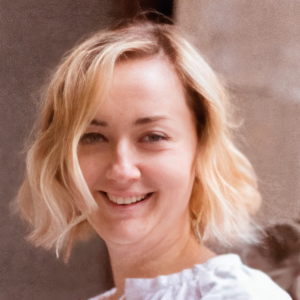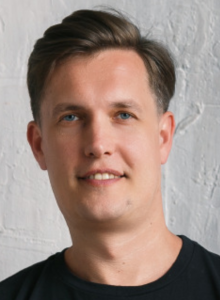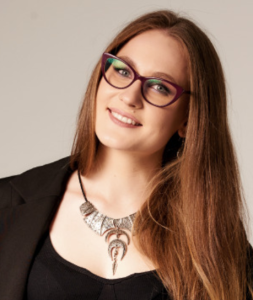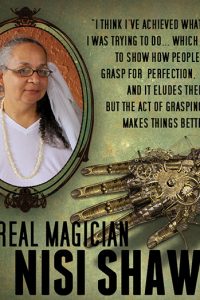SF in Ukraine: On Fantasy Tropes and Romanticizing Reality
I fell in love with fantasy at age seven thanks to the Harry Potter series. I remember reading at school, in between the lessons, and at home. I even drew the lightning scars on my very willing classmates, so life could feel more the way I thought it should be: heroes – valiant; stakes – to save the whole world; evil – the most vicious you can imagine. What fantasy book doesn’t have wars, the duality of light and darkness, battles and magic? In the character’s struggle, I learned about the strength to fight and resolve to stand strong. When I was 13, The Hunger Games came out, followed by Divergent and other young adult SFF novels, focusing on youngsters in revolutionary positions, solidifying my romantic and somewhat naive view on the most common themes of the genre: war, suffering, pain, and violence. I became a writer. I concocted big plots and used the topics mentioned above with all the respect I had based on what I learned about them.
Then my country was invaded by Russia. In 2014, Russia annexed Crimea and initiated fighting in the Donbas region. In 2022, it began a full-scale invasion to wipe us from the face of the world. The first thing I remember about February 24th, 2022, is the air-raid sirens. I turned my phone on to see hundreds of messages about cities under siege or in occupation and hundreds of people running away in search of safety. You could say I woke up amidst those topics I read or wrote about. At that point I was finishing my second novel, and my publisher was located in Kharkiv – the city in the northeast of the country, 70 kilometers from the border with the Russian Federation. Kharkiv was shelled and bombed nonstop. With reality so fantasy-like I couldn’t comprehend writing until my editor, still located in Kharkiv, reached out to ask me not to stop writing, because he was spending up to 16 hours per day hiding in the subway, and focusing on his work was what kept him sane. So I had to find my path back to fantasy, feeling uneasy at the way my perception of genre had changed. But how much? I felt the change seeping slowly into my style, and my choices of themes and messages, but how do you measure something so gradual? Something you’re not even sure you’ve already experienced a catharsis over?
By comparison, and talking. With the terrifying second anniversary of the invasion behind us, I decided to try and explore the depth of the changes we’ve experienced by talking to four prominent Ukrainian authors of SFF genres – fantasy, science fiction, postapocalypse, and space horror – about how their vision of the genre has changed for them, how it might change in the future, and what lessons Ukrainian SFF writers have learned after what they’ve lived through, so they can shed light on the subject for those who haven’t.
•

Iryna Hrabovska is a Ukrainian writer and blogger. She was born in Snizhne (Donetsk region) and is the author of the sword and sorcery fantasy books Stars and Bones (2022), The Land of the Winged (2023), the novella The Closest Ones to Hell in the fantasy collection Chronicles of the Unknown Lands (2023), and the steampunk duology Leoburg: The Rebel’s Last Resort (2019) and The Last War of Empires (2020). The duology is based on the historical events of the Euromaidan and the beginning of the Russian war in Ukraine. In 2018, Iryna co-authored a military documentary bestseller – In the Ring of Fire. The Operation of Lugansk Airport Defense – under the pseudonym Anastasia Voronova. In 2020, The Rebel’s Last Resort was included in the long list of the BBC Book of the Year awards. Stars and Bones also became a bestseller of Vivat Publishing House with a total circulation of over 9,000 copies.
Your hometown of Snizhne has been occupied by Russia since 2014, and in 2022 you saw the return of hostilities to your region. How has your writing changed before and after two invasions?
IH: I started writing the Leoburg Duology in 2012. In the first book, the protagonist finds himself in Leoburg – a city of inventors that has been heavily influenced by empires, including the Russian one. Designed as a free place to create, invent, and make scientific discoveries without the oppression of authoritarian regimes, Leoburg gradually became a prison due to Russians bribing the founding fathers. Inventors are forced to work for the interests of the empire, not for their research. So I planned for the next part to feature a revolution and then a war for the independence of Leoburg, along with its situational allies – the Ukrainian Kingdom, the Duchy of Poland, the Triple Baltic Alliance, and the Danube Duchies. But in 2013, I couldn’t imagine that I would see the war right here at home, in the Donetsk region. Perhaps we all anticipate certain events when this fear is in the air. War makes us grow up immediately, no matter what age you are. This is very evident in the tone of the first and second books of the duology, there is an abyss between them. The second book, which I started in 2015, was planned as if by a completely different person. Now I knew what it was like to be helpless in the face of a gigantic power and to resist with no tomorrow. I decided to weave into the alternative reality the events that took place in our country – Euromaidan and the beginning of the war in eastern Ukraine. I already knew what it was like to lose my home because I hadn’t been to Snizhne since 2014 and I wasn’t sure if I would ever go back. I knew what it was like to lose friends, to experience tremendous pain and trauma for the entire nation. The war didn’t just affect us in 2022, but the full-scale invasion spread and augmented that trauma to people in all parts of the country, even those who were previously untouched by it. I’ve noticed that somehow the war keeps sneaking into my novels, this topic won’t let me go and I’m not sure I’ll ever be able to get rid of it not only because I’ve experienced it, but because I can now see that we live near the empire of evil. The Russian empire is alive. It came for us and it will come for other people too. Our fight with colonialism and de-imperialisation is far from over.
Modern fantasy has moved away from the clearly cut sides of good and evil and focuses more on morally gray characters. Yet since the beginning of the Russian invasion of Ukraine, people started calling the Russians as Tolkien’s orcs. Why is that comparison so popular?
IH: The so-called “gray morality” came with the development of the dark fantasy subgenre, while Tolkien’s characters were well distinguished between sides of light and evil. I like to portray characters as ambiguous, because everyone has both inner light and inner darkness to some degree. However, the comparison of Russia with Mordor and Ukraine and the free world with Middle-earth has a certain basis. War in the 21st century has become incredibly visible. It’s almost impossible to hide your crimes when there’s a drone in the sky and everyone has a smartphone. Videos from the battlefield and liberated areas appear live every day. And if Russia could hide its inhuman way of fighting and treating civilians and POWs during the wars in Chechnya or the attack on Georgia, now it’s too difficult. That is why the incredible number of war crimes (let’s remember Bucha, Mariupol, Izium) committed by the Russian army every day has come to light. We see before us pure, unpunished evil and acts that can hardly be called human. And these are not isolated cases – this is the way the Russians fight. So, yes, we have woken up in a Tolkienian world, where good fights evil, where light and darkness are extremely well distinguished.
•

Max Kidruk is a Ukrainian writer whose professional career began in 2009 with travelogs and continued with thrillers, among them Don’t Look Back and Don’t Speak (2017), Where There Is No God (2018) and Until Light Goes Out Forever (2019). In 2023 he released Colony – the first installment in a sci-fi trilogy, New Dark Ages. The book became a national bestseller, selling over 40,000 copies. Colony was included in the long list of the BBC Book of the Year award.
In your Colony, the first instance of the New Dark Ages trilogy, you’re painting quite a dark picture of the future of human civilization. Have you felt the reality of taking a step closer to the world of your book recently and specifically after February 24th, 2022?
MK: There were readers who reproached me for this very reason, saying that Colony is too gloomy and that science fiction should depict the moral and ethical progress of humanity, and glorify the future, instead of denigrating it. With all due respect, this view seems somewhat naive to me. Especially after February 24, 2022. My opinion is that after a full-scale Russian invasion, all science fiction books about the “moral and ethical progress of mankind” can be thrown into the trash. Sorry. They all have failed. The whole culture has ultimately failed. And that is why my Colony is like this. I deliberately depict the bleakest possible future for humanity. And the thing is not that I like it. The thing is that I, as an author, try to make it as realistic as possible and warn in this way: look at what can happen to us, to our planet, to our civilization – and this is more than real, this really can happen. I’m trying to engage the reader in the discussion: Okay, things are bad and will only get worse, but let’s sit down and think about what we can do to prevent this from happening. And that’s actually the main reason why I started writing the New Dark Ages series.
In the reviews of your book some people write it’s so refreshing to see Ukrainians represented in SFF, but others say it hurts to read about the future that is not too much better than the present. Has your vision of the goal of science fiction changed in the face of recent events?
MK: I consider realism to be the strongest feature of my novel. This applies to everything – technology, climate, the social sphere. And it’s really simple when you write about other nations on Mars. It is much more difficult when you depict the future of Ukraine and Ukrainians. I thought a lot about this even before the Russian invasion began. There was a temptation to write something pathetic and heroic – I’m sure readers in Ukraine liked it – but in the end, I decided that it’s wrong. It’s naive. And most importantly, it won’t change anything.
Colony received a lot of positive reviews, much more than I could have ever imagined, considering how complex and large this text is, and those that were negative, all agreed on one thing: Readers did not like how I described Ukraine in the 22nd century, they don’t like that Russia in my story still exists. But that’s the point: Russia will not disappear anywhere, Russia is unlikely to change, remaining an authoritarian, imperialist, and chauvinistic country, and we, Ukrainians, will have to deal with this for decades, if not longer. No matter how unpleasant it is to read about it in a fiction book, we, as a nation, must be ready for this. We must learn to develop and grow under the constant threat from the East.
•

Svitlana Taratorina is a writer raised in Crimea. She debuted in 2018 with her novel Lazarus, for which she received the LitAccent of the Year – 2018 award, The Chrysalis Award from the European Science Fiction Society, the special award from the Institute of Books in Ukraine (2019) as well as the special award from LvivBookForum (2019). In 2023 her postapocalyptic novel The House of Salt came out, based on the mythology, history, and modern history (post-2014 annexation) of Crimea.
Ukrainian literary critic Rostyslav Semkiv said that in his opinion, dystopias, utopias, and postapocalypses will be one of the most popular genres in Ukraine after the war. Do you agree?
ST: I started writing my postapocalyptic novel The House of Salt a few years after the annexation of Crimea. It took several years to decide to write this story because the annexation became my personal tragedy. I lost the place where I grew up, the house of my parents and ancestors, the graves of my relatives. A man-made disaster occurs in The House of Salt, and the once flourishing peninsula turns into an uninhabitable land, its people becoming mutants, its myths and legends coming to life. The catastrophe that befell my fictional world became a metaphor for the annexation of Crimea that happened in 2014. The House of Salt combines the aesthetics of the Chornobyl zone and Mad Max at the same time, as since 2014 Crimea has become a closed Zone for me.
If I had crossed the border with the peninsula, I would have been taken away by the FSB (Federal Security Service of Russia, former KGB). Just like that in 2014 I vividly realized how the Crimean Tatars felt when Stalin ordered their deportation from Crimea in 1944. Imagine, he ordered the deportation of all 200,000 indigenous people of Crimea from their homes! History is repeating itself. After the annexation of Crimea in 2014, tens of thousands of Crimeans were forced to leave the peninsula. Those who remained live with a sense of constant fear and threat. Today’s Crimea and all of Russia is an Orwellian novel. But at the same time, in the world of The House of Salt, the characters seek to understand what happened to them. They try to find out the causes of the catastrophe. For me, The House of Salt is about hope. In general, I believe that postapocalypse is a genre about hope. In Ukraine, they say that “Fire does not burn the fierce ones” which means that those who have already been burned by fire have nothing to fear. That is why I disagree that dystopian and postapocalyptic genres will be popular in Ukraine. These horrors can frighten stable societies and countries where there are no wars. It is these societies that are afraid of authoritarianism, dictatorship, man-made disasters, and wars. Ukrainians live with these challenges every day. That is why we are not afraid of them, but rather amused by them. What Ukrainians need much more now are good escapist stories where good necessarily triumphs over evil. We believe in it, we fight for it and we want to read about it.
During an interview with the Fantastic talk(s) YouTube channel (<www.youtube.com/watch?v=vJk3gHFmZws>), Margaret Atwood said that we live in science fiction because never before in human history have we woken up with such anticipation of discoveries. What do you think?
ST: No, we live in a new dark age. After WWII, humanity believed that our immediate future was spaceflight, first contact, and the unity of all mankind in the face of alien threats. But wars, and in particular the horrors of the war in Ukraine, have shown how far we are from this future. Our entire culture and civilization can be wiped off the face of the planet with a single move by a crazed monkey with a nuclear button at his fingertips. But the price of our civilization is the ability to stop this monkey. That is why we are back in the new dark ages when courage and boldness are the most important things we need. The leading countries must demonstrate their global leadership, and show the world that there are values worth fighting for, no matter what. They must show that fear today can lead to a major catastrophe in the future. We are the generation that determines the future of the planet. If we do not unite now in the fight against evil, this future may become the world of Orwell’s 1984 or The Man in the High Castle by Dick, or the reality of Mad Max, where we will kill each other for oil. Fear is the only thing that stops the civilized world from destroying Russian terror. But all science fiction is about how to overcome this fear.
•

(2020)
Volodymyr Kuznietsov is a writer from Severodonetsk, Luhansk region. In 2019 he debuted with Zakolot (The Mutiny) – a sci-fi horror novel set in the dystopian future where Axis countries won and established a totalitarian Empire, causing the downfall of Humanity. In 2020 he released a grimdark fantasy novel Vohnevyr (Flamestorm) focusing on the fantasy interpretation of the Golden Horde occupation of the Kyivan Rus. Volodymyr Kuznietsov is a recipient of the 2020 Chrysalis Award from the European Science Fiction Society. In your lifetime, you’ve had to evacuate from your hometown twice and see it under occupation – in 2014 and 2022. How did working in SFF help you come to terms with your experience?
VK: For me, this metamorphosis started way back in 2014. My hometown was under Russian occupation, and there were kidnappings, abductions for ransom, imprisonments, torture, and even drunken shootouts on the streets between the different Russian mercenary groups. I took my family and fled the city – fortunately just for a few months, after which the Russians were forced to retreat by the Ukrainian Army. Those days we were terrified – but we were also confused. It was not the first time Russia invaded its neighbors, and we were aware of that – but none really believed it would attack us. This terror, confusion, and civilization gap between Ukrainians and Russians (Russian imperialistic view against the Ukrainian generational trauma of 1930s genocide) that became suddenly so painfully evident, in time I’ve turned into a novel called Zakolot – about the totalitarian, militaristic Empire falling, rising, and falling again – and about the people of the Empire, both from the metropolis and the colonies, showing how different they are in the end. Yet, back then I didn’t make judgments, leaving the choice to the reader. I was, like any grimdark author, using the “gray moral” principles, showing all sides from different perspectives.
And then the full-scale invasion began. I saw how entire cities were bombed into rubble together with their inhabitants. I witnessed how civilians were murdered simply because they were suspected of being ex-militaries or pro-Ukrainian activists. I know full well how it feels knowing that if the Russian soldier enters your house, he will probably kill you and your family – just because you have books in Ukrainian on your shelves in the living room.
We were lucky to escape this hell. We were lucky to experience just a small fraction of it.
Shortly after I arrived in Lviv, I began volunteering to help the Army and the refugees and documenting the war as well. I was a part of the Inker project – a comic book series, based on real stories of Ukrainians during the full-scale invasion. Prisoners, guerilla fighters, activists, volunteers, elderly people, and children. I wasn’t creating stories from scratch, but giving voices to the real people around me. I wrote 10+ comic book scripts – some tragic, some outright horrific, and not all – with a happy ending. It took me almost a year of work and the work wasn’t easy. In the end, I felt that I just couldn’t write about war anymore. Soon I found out that I couldn’t force myself to not write about war.
I know a lot of my colleagues cannot reflect on this matter now. The wound is still fresh, the shock is too deep. I don’t feel my writing is some therapy, it’s always a struggle with an emptiness after a final sentence. It is hard to explain how one feels, discovering daily, that another person, another place, another thing that was in arms reach for the whole one’s life – is lost forever. It drags on for years – and you are desperately trying to… to do what? Is there even an answer to this?
All I know – I can write books. Sci-fi, horror, fantasy. Sometime in the past, they were pretty much just a reflection of my heavy metal teenage years. Now it’s different. Now it’s fair and square, a metaphor for some very real things. I don’t know if anyone can see the true meaning through the decorations. To be honest, I don’t care much. I’m just using the tools I’m good with. I’m surely not the first in SFF to do so. And sadly, not the last also.
As a person who has witnessed firsthand the events that are used as tropes in speculative fiction (occupation, war, being a refugee), what is your opinion on using those events by authors who have not had such an experience?
VK: I wouldn’t go as far to accuse anyone of dishonesty, of course. There is little to no hypocrisy in writing about something you haven’t experienced yourself – it’s often not about the realistic depiction of events, but about personal reflections on them. Don’t get me wrong – depicting war in speculative fiction, movies, or games has been an accepted form of entertainment since the dawn of time. A chess game or the legends of King Arthur and his knights are not about the horrors of war and certainly not aiming to show you the POV of a pawn, sent to be sacrificed for achieving some greater success. We love entertaining ourselves with strong, yet safe emotions – including terror, wrath, and even fury. War is the best background for characters to experience such emotions – as well as for the readers. The problem with speculative fiction war novels is not in the fiction itself – it’s in the reaction to it. Such novels are often praised for metaphorically showing the real war events and for reflecting the generational traumas. A lot of mid-20th century US/UK sci-fi and fantasy are totally worthy of such praise. Yet later works are often written by the authors with… let’s say indirect experience and a point of view of the peaceful generation. I may be wrong, but nothing I’ve been through, nothing my family and friends faced, nothing I see daily resonates in any way with such books. And I know why that is so – because I was writing in such a manner myself – until 2014. Until I faced the war with my own eyes. I just can’t perceive the war as something abstract, a strategy game, or a stage for heroic acts. It suddenly became very personal – for it touched me directly, my parents, my sister, my nephew, and a lot of my friends and relatives. Each time I write about war, I’m anxious and I constantly check, if I’m not distorting or abusing the events and characters, and what senses I’m transferring through the text.
Ukraine never started a single war. Never as an independent state waged war on foreign soil. But throughout our history, we learned all too well what invasion and occupation mean. What genocide means. And should we ever forget that there’s always a helpful neighbor to remind us of it. In my lineage, every single generation faced Russian invasion and occupation. Even my mother and father, born in the peaceful ’60s, face it today. My grandparents survived the Holodomor, WWII, and postwar famine and repressions. And believe me – almost all Ukrainians have a similar family history. The main lesson is probably that: There is evil in the world. The orcs and goblins of J.R.R. Tolkien are real. Sauron and his armies may look to you as outdated, compared to the modern villains with deep and intricate motivations, child traumas, and other fancy stuff – but all that quickly becomes irrelevant when you are face to face with a horde of murderers, rapists, and marauders unleashed upon you by a demented tyrant. And “murderers, rapists, and marauders” are not some exaggerations. A significant part of the Russian army are ex-convicts pardoned in exchange for service contracts. And with the pardon, they were given permission (if not a direct order) to kill, rape, and maraud. They are poorly armed, and barely trained and their physical condition is pitiful due to the horrible conditions in Russian prisons. They die by thousands – and it suits their tyrant well. The more died – the less professional killers he will have to deal with later. So much for the gray morals and complicated antagonist stuff.
But there’s a backside of this – if the Evil is real so must be the Good. We cannot surrender – for surrender will lead to yet another cycle of ethnical cleansing, culture cancelation, mass repressions, and deportations. Again, this is not some assumption it’s already happening. We do not see ourselves as the Good incarnate, no. But we hope there’s enough Good in the world to help us overcome this in the end.
•
After February 24th, 2022 the world turned its eyes to Ukraine. Ukraine in turn was more than eager to talk about our experience. Amidst the current trends in modern SFF we find diversity, and the desire to hear various voices from all over the globe and I look forward to seeing Ukrainian SFF in English – its stories about hope, pain, and fight for Good. Because if there’s one thing that SFF tells is that no matter how big the Evil is, don’t ever stop fighting.
–Daria Piskozub

Daria Piskozub is a writer and Youtuber. Her debut novel Machina, the first installment in the postapocalyptic fantasy tetralogy, won a Brama fantasy novel award in 2019 and was published by Vivat Publishing in 2020. In 2021 Daria became an interviewer of the world-renowned science fiction/fantasy authors at the Fantastic talk(s) and Vivat Publishing” YouTube channels; the former won an award from the European Science Fiction Society in 2023. Two collections of short stories she collaborated on – Chronicles of the Unknown Lands and Legendarium of the Peculiar Cities, came out in 2023. Hemma, the second novel in the Machina tetralogy, came out in 2023 as well. Her stories were translated into Polish in Nowa Fantastyka magazine.
Photographers: Alisa Tischenko, Roman Dombrowski, Olexandr Plaxin, Bohdanna Kudryk,
This report and more like it in the May 2024 issue of Locus..
 While you are here, please take a moment to support Locus with a one-time or recurring donation. We rely on reader donations to keep the magazine and site going, and would like to keep the site paywall free, but WE NEED YOUR FINANCIAL SUPPORT to continue quality coverage of the science fiction and fantasy field.
While you are here, please take a moment to support Locus with a one-time or recurring donation. We rely on reader donations to keep the magazine and site going, and would like to keep the site paywall free, but WE NEED YOUR FINANCIAL SUPPORT to continue quality coverage of the science fiction and fantasy field.









Thank you so much for this article and these interviews. Ukraine is the land of my grandparents and ancestors, and I can’t imagine the suffering that’s going on there now. For anyone interested in reading Ukrainian fantastica in English translation, I highly recommend Embroidered Worlds: Fantastic Fiction from Ukraine and the Diaspora, edited by Valya Dudycz Lupescu, Olha Brylova, and Iryna Pasko, that came out last year from Atthis Arts.
I would like to plug Victor Shepelev aka zverok who wrote the not yet published “Going to Yalta After the Apocalypse” in 2022. I read it as it was written, day by day on https://goingtoyalta.substack.com/ and thoroughly enjoyed it!
“The morning of the apocalypse, I overslept.
[…]”